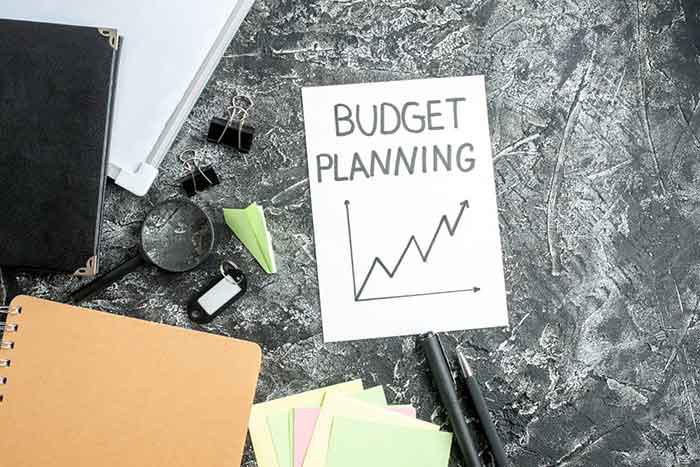How to Prepare a budget is a foundational step towards achieving financial stability and meeting your financial goals. Whether you’re aiming to save for a big purchase, pay off debt, or simply gain better control over your finances, a well-planned budget is essential. This guide will take you through the process of creating a budget from start to finish, covering everything from setting financial goals to tracking your expenses and making adjustments along the way.
1. Understand Your Financial Goals
Before diving into the mechanics of budgeting, it’s crucial to identify your financial goals. These goals will guide your budgeting decisions and give you a clear sense of purpose. Financial goals can range from short-term objectives like paying off credit card debt or saving for a vacation, to long-term goals such as buying a home, funding your children’s education, or building a retirement nest egg.
2. Calculate Your Income
The first step in preparing a budget is to determine your total monthly income. Include all sources of income, such as salaries, wages, bonuses, rental income, side hustles, and any other regular sources of money coming into your household. If your income varies month to month, use an average based on the past few months to get a realistic picture.
3. Track Your Expenses
Tracking expenses is fundamental to understanding where your money goes each month. Start by categorizing your expenses into fixed and variable categories:
Fixed Expenses: These are expenses that stay relatively consistent each month, such as rent/mortgage payments, car payments, insurance premiums, and utilities.
Variable Expenses: These expenses fluctuate from month to month, such as groceries, dining out, entertainment, clothing, and transportation costs.
Use tools like budgeting apps, spreadsheets, or even a simple notebook to record your expenses. Review bank statements, credit card statements, and receipts to ensure you capture all expenditures accurately.
4. Create Categories and Allocate Funds
Once you have a clear understanding of your income and expenses, categorize your expenses and allocate funds accordingly. Start with essential categories like housing, utilities, transportation, groceries, and debt repayments. Then allocate funds for discretionary categories such as entertainment, dining out, vacations, and savings.
Ensure that your total expenses do not exceed your total income. If you find that expenses exceed income, you may need to reevaluate and prioritize your spending or look for areas where you can cut back.
5. Prioritize Savings and Debt Repayment
A crucial aspect of budgeting is prioritizing savings and debt repayment. Aim to allocate a portion of your income towards savings goals, such as an emergency fund, retirement savings, or a down payment for a home. Additionally, prioritize paying off high-interest debt to reduce financial stress and free up funds for other financial goals.
6. Use Budgeting Tools and Apps
Take advantage of technology to simplify the budgeting process. Budgeting apps like Mint, YNAB (You Need A Budget), or Personal Capital can automate expense tracking, categorization, and provide insights into your spending habits. These tools can also generate reports and visualizations that make it easier to monitor your progress towards financial goals.
7. Monitor and Adjust Regularly
Budgeting is not a one-time exercise; it requires ongoing monitoring and adjustments. Regularly review your budget to track your actual expenses against your budgeted amounts. Identify any discrepancies or areas where you overspent and adjust your budget accordingly for the following month.
Life circumstances and financial priorities can change, so be flexible with your budget and update it as needed. This flexibility will ensure that your budget remains relevant and effective in helping you achieve your financial goals.
8. Plan for Irregular Expenses and Emergencies
Incorporate irregular expenses and emergencies into your budgeting plan. These can include annual insurance premiums, vehicle maintenance, medical expenses, or home repairs. Setting aside a portion of your income each month for these expenses will prevent them from derailing your budget when they arise.
9. Involve Your Family or Partner
If you have a family or share finances with a partner, involve them in the budgeting process. Collaborate on setting financial goals, making spending decisions, and reviewing the budget together regularly. This fosters transparency, accountability, and ensures that everyone is aligned with the financial plan.
10. Seek Professional Guidance if Needed
If you find budgeting overwhelming or have complex financial circumstances, consider seeking guidance from a financial advisor or counselor. They can provide personalized advice, help you set realistic goals, and develop a budget that aligns with your long-term financial objectives.
Conclusion
Preparing a budget is a powerful tool for taking control of your finances and achieving financial well-being. By understanding your financial goals, tracking expenses, prioritizing savings, and making adjustments as needed, you can create a budget that supports your aspirations and helps you navigate both short-term and long-term financial challenges. Remember, the key to successful budgeting lies in consistency, discipline, and a willingness to adapt to changing circumstances. Start today and take the first step towards a more secure financial future.
Keep an eye for more news & updates on VentsBreaking.com!

